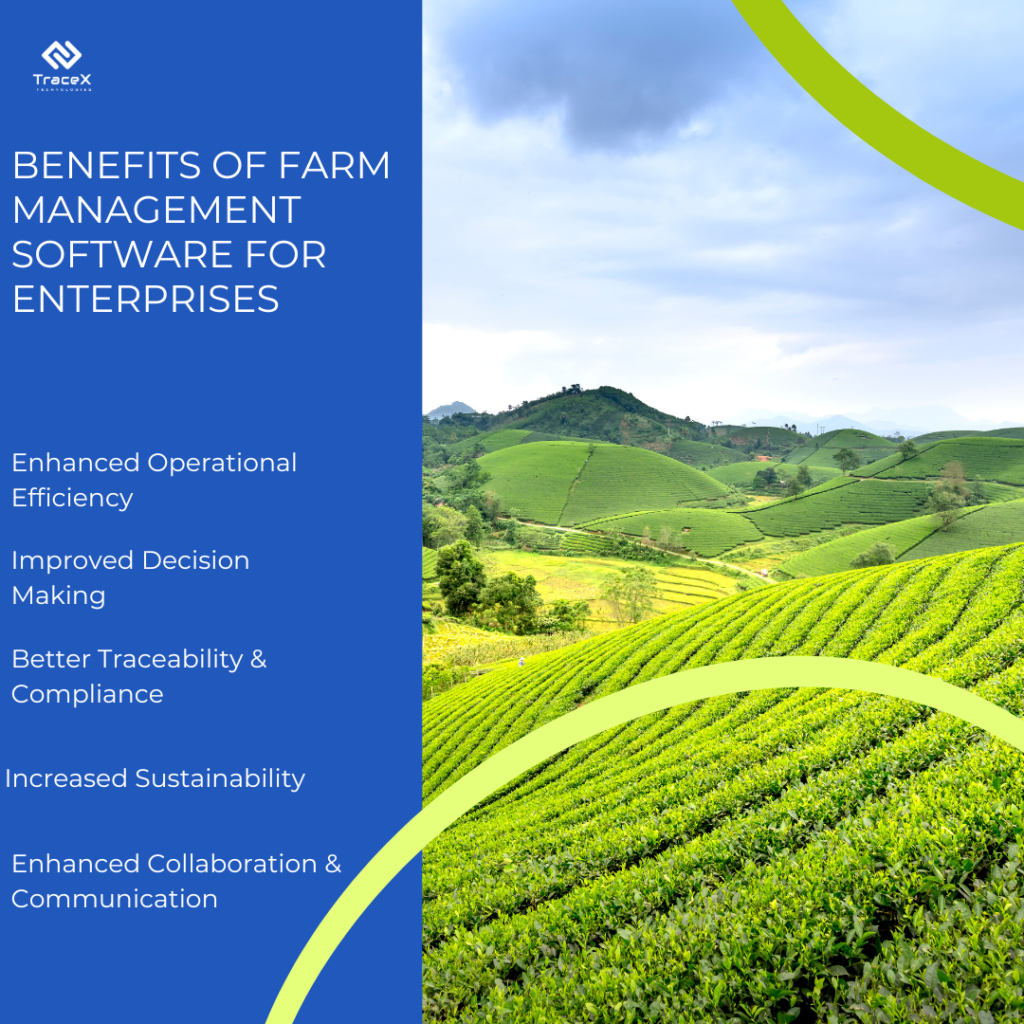Contact: +91 99725 24322 |
Menu
Menu
Quick summary: Discover the top 5 advantages of implementing farm management systems for enterprises in agriculture. Explore how these systems optimize operations, enhance decision-making, and drive sustainable practices for long-term success.

In evolving agricultural landscape, enterprises are faced with the challenge of maximizing efficiency, productivity, and profitability while adhering to stringent regulations and sustainability standards. As the demand for transparency, traceability, and responsible farming practices continues to grow, the need for robust farm management systems for enterprises has become paramount. These innovative solutions offer a comprehensive suite of tools and functionalities designed to streamline operations, optimize resource utilization, and drive data-driven decision-making.
By embracing farm management systems, enterprises can unlock a world of operational excellence, positioning themselves as industry leaders in an increasingly competitive and environmentally conscious market.
Agricultural enterprises often encompass a multitude of interrelated activities, from crop cultivation and livestock management to harvesting, processing, and distribution. Coordinating these diverse operations can be a daunting task, particularly when dealing with geographically dispersed facilities and teams. Farm management systems provide a centralized platform that seamlessly integrates and manages various agricultural processes, enabling real-time monitoring and control.
Through intuitive dashboards and interfaces, farm managers can oversee and coordinate activities across multiple locations, ensuring smooth workflow and efficient resource allocation. This holistic approach minimizes operational silos, facilitates cross-functional collaboration, and enhances overall productivity.
As consumer demand for transparency and food safety continues to rise, enterprises must prioritize traceability and compliance with stringent regulatory standards. Farm management systems play a crucial role in ensuring adherence to these requirements, providing comprehensive record-keeping and reporting capabilities.
Explore how supply chain transparency enhances food safety and quality
Learn more about the critical role transparency plays in safeguarding the integrity of our food supply chain
From tracking the application of pesticides and fertilizers to monitoring environmental impacts and labor practices, these systems maintain detailed audit trails and historical data. This meticulous documentation not only facilitates compliance with local, national, and international regulations but also fosters trust among consumers, retailers, and regulatory bodies, enhancing the enterprise’s reputation and market access.
The food supply chain is a complex network involving numerous stakeholders, from producers and processors to distributors and retailers. Effective logistics and distribution management are essential for ensuring the timely delivery of fresh produce, minimizing waste, and meeting consumer demand. Farm management systems offer powerful tools to optimize this intricate supply chain.
By integrating with transportation management systems and real-time tracking technologies, these solutions enable enterprises to monitor the movement of goods, optimize transportation routes, and manage inventory levels. Additionally, predictive analytics and demand forecasting capabilities allow for proactive planning and efficient resource allocation, reducing costs and minimizing disruptions.
In the age of big data, enterprises that harness the power of information gain a significant competitive advantage. Farm management systems act as powerful data repositories, capturing and consolidating information from various sources, including field sensors, weather stations, and operational records.
FMS goes beyond simple data collection by providing powerful analytics tools that transform raw data into actionable insights. Here are some key benefits:
By leveraging advanced analytics and reporting capabilities, these systems transform raw data into actionable insights, enabling farm managers to identify trends, detect inefficiencies, and make informed decisions that drive growth and profitability. From optimizing crop rotation patterns to identifying new market opportunities, data-driven decision-making becomes an integral part of the enterprise’s strategic planning and execution.
Learn how leveraging data can revolutionize farming practices, increase productivity, and promote sustainability.
Discover the power of data-driven agriculture
As the world grapples with the challenges of climate change and resource depletion, the agricultural sector plays a vital role in promoting sustainable practices. Farm management systems empower enterprises to strike a balance between productivity and environmental responsibility, providing tools and metrics to monitor and mitigate their environmental impact.
From tracking greenhouse gas emissions and water consumption to optimizing fertilizer and pesticide usage, these systems enable enterprises to implement eco-friendly farming practices, reduce their carbon footprint, and contribute to the conservation of natural resources. By embracing sustainability, enterprises not only address consumer demand for responsible agriculture but also foster long-term resilience and profitability.
Agriculture is a labor-intensive industry, and effective workforce management is crucial for ensuring operational efficiency and employee well-being. Farm management systems offer robust tools for managing human resources, from scheduling and task allocation to monitoring labor compliance and safety protocols.
By streamlining workforce planning and optimizing resource allocation, these systems help enterprises maximize productivity while minimizing labor costs. Additionally, features such as training modules and safety monitoring ensure that employees are equipped with the necessary skills and operate in a secure environment, promoting job satisfaction and retention.
The agricultural sector is constantly evolving, with new technologies, regulations, and market trends emerging at a rapid pace. Farm management systems are designed with integration and scalability in mind, allowing enterprises to adapt and future-proof their operations.
These systems seamlessly integrate with a wide range of third-party applications, sensors, and platforms, ensuring a cohesive and interoperable ecosystem. As enterprises expand or diversify their operations, farm management systems can scale accordingly, providing a flexible and extensible foundation for growth and innovation.

In today’s dynamic agricultural landscape, enterprises face a multitude of challenges ranging from operational coordination to environmental responsibility. However, with the advent of TraceX Farm Management Software, these challenges are being met with innovative solutions that redefine the way enterprises operate.
Seamless Operational Coordination: TraceX provides a centralized platform that enables seamless coordination among various departments and stakeholders within the enterprise. From crop planning to harvesting, every aspect of farm operations is efficiently managed, ensuring optimal resource utilization and improved productivity.
Supply Chain Optimization: With TraceX, enterprises can optimize their supply chain by streamlining logistics and distribution processes. Real-time tracking of inventory levels, efficient route planning, and timely delivery management help minimize wastage and reduce costs, ultimately enhancing overall supply chain performance.
Data-Driven Decision Making: TraceX empowers enterprises with actionable insights derived from comprehensive data analytics. By harnessing data on crop yields, weather patterns, market demand, and more, decision-makers can make informed choices that drive profitability and sustainability across the entire agricultural value chain.
Sustainable Practices: TraceX promotes the adoption of sustainable farming practices by providing tools and functionalities that enable enterprises to balance productivity with environmental responsibility. From monitoring soil health to optimizing irrigation systems, the platform facilitates the implementation of practices that minimize environmental impact while ensuring long-term agricultural viability.
Integration and Scalability: As agriculture continues to evolve, enterprises need solutions that can adapt to changing needs and scale with their growth. TraceX offers seamless integration with existing systems and the flexibility to accommodate future expansions, allowing enterprises to stay ahead of the curve and remain competitive in a rapidly evolving industry.
Ready to revolutionize your agricultural operations?
Unlock efficiency, sustainability, and growth with TraceX Farm Management Software.
Try it today!
In the dynamic and ever-changing landscape of modern agriculture, the importance of farm management systems for enterprises cannot be overstated. These comprehensive solutions offer a multitude of benefits, from streamlining operations and optimizing resource utilization to ensuring compliance with regulations and promoting sustainable practices.
By embracing farm management systems, enterprises gain a competitive edge, unlocking operational excellence, data-driven decision-making, and the ability to adapt to emerging challenges and opportunities. As the world continues to demand more transparency, traceability, and environmental responsibility, these systems equip enterprises with the tools and insights necessary to thrive in the agricultural sector.
Whether it’s maximizing yields, enhancing supply chain efficiency, or promoting environmental stewardship, farm management systems empower enterprises to navigate the complexities of modern agriculture while maintaining a steadfast commitment to productivity, profitability, and sustainability. Investing in these innovative solutions is not just a business decision but a strategic move towards securing a prosperous and responsible future for the agricultural industry.
